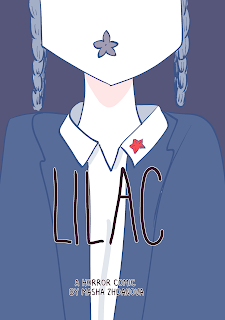April Malig's zines are closer in spirit to classic perzines of the late 80s and 90s than typical diary minicomics, in part because she frequently eschews typical line art in favor of photos heightened with color changes. There's a wonderful, revealing chattiness to these zines, as Malig in the zine Leftovers says "I just made this for fun and to make something pretty (I feel like that shouldn't be such a weird thing to say?)" Indeed not--for Malig, there's no such thing as a guilty pleasure. Malig tends to favor bright and soft colors, taking photos and altering them to emphasize pinks, blues, and purples. A lot of Malig's zines and comics are about travel, especially in Asia, and she has a way of capturing the bustle of other places with both enthusiasm and respect.
I Didn't Write Enough Postcards is Malig's travel zine about Singapore and Taiwan. It's text followed by a photo on its opposite page, and there's a wonderful breathlessness to Malig's narration. She's unconcerned with typical tourist interests; she's there to eat and buy manga and see friends, and other fun activities along the way (like seeing a Museum of Miniatures) are a byproduct of this point of view. There's an unspoken poignancy to all of this, as it was two months before COVID shut everything down. April's Food Zine #2 is great because it's so intensely local to her in Queens, and the reviews are so quirky, like a coffee shop that sells onigiri with a chatty, dad-like guy running it. You find that Malig doesn't care about "authenticity" in the least even as her palate is quite adventurous. Malig is after delicious food and doesn't care where it comes from, including a 7-11 with some surprising fare.
Some Tender Nothing is a combo abstract drawing/photo zine that goes into full neon colors, mimicking the night markets and street lighting she sees. All I Do is Play Animal Crossing and Online Shop is a COVID journal that captures what that particular video game did for a lot of people: provide blissful distraction, pleasant interactions with friends, and a brief halt to thinking about grief and death. It's a mix of black & white cartooning and images taken from the game itself, which Malig deliberately blurs with reality. Finally, Rotten Roses 2 continues the story of four friends in a group chat who are obsessed with a particular boys love manga and its various adaptations into other media. There are two things of note here (beyond Malig's sharp character design): the celebration of fan fiction as a creative group exercise, and the ways in which a highly specific set of mutual and obscure interests can create lasting bonds. One tends to reveal oneself through the way one makes art, but fan obsessions can also expose intimate and personal details as well. All of this is somewhat impenetrable to a reader, but the specifics of the fandom are less important than the emotions it invokes.
Like Malig, Masha Zhdanova's tastes are highly informed by manga, among many other sources. In her micro-mini A Comics Mixtape, Zhdanova offers an unfolding map of how and which comics influenced her over the years, starting with Vera Brosgol's Anya's Ghost, in part because it made her think she could draw her own comics. Zhdanova cleverly takes the reader's eye across the page, including "downstairs" as she continues to descend into her mind. She namechecks manga, webcomics, books, and frames from Soviet cartoons her father used to show her.
Zhdanova emigrated to the US at age two, something she explores in A Grey Mountainous Curly Wall. This is about a song sung to her as a child and her subsequent feelings of alienation toward her old country. It's not just that she was socialized as an American; the fact that she's queer, Jewish, and progressive meant that she realized she'd never feel welcome. This comic represents an attempt to connect with the music of her childhood, music directly connected to resistance in its own way.
Lilac, subtitled "A Horror Comic," plays on some of these themes. It's about a Russian girl whose mother forces her to devour 5-sided lilacs, because it will give you good luck on your exams. It's a horror story that's really about a mother denying her child an opportunity to be herself, as the girl (Lena) falls in love with another girl and they promise to go to school away from their small town. As her mother grows sicker and clingier, it's revealed that there's more than luck going on with Lena eating the lilacs. Zhdanova's line is simple, expressive, and harsh, even as she uses soft colors as a way to create emotional dissonance. Zhdanova has a lot of refinement and greater control of her line to work on, but she already possesses a special touch in writing stories about alienation.







No comments:
Post a Comment